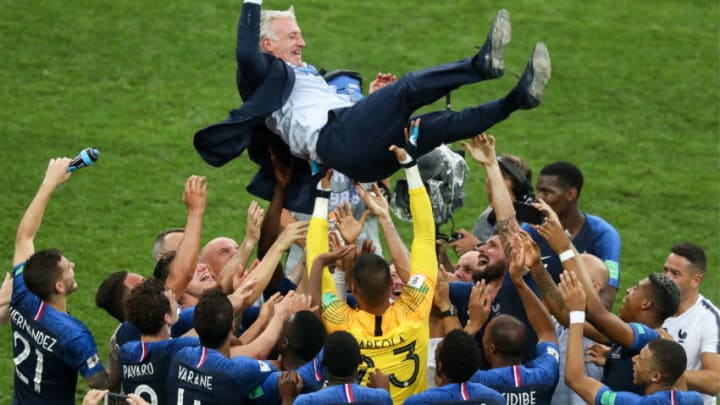France won the World Cup because of Didier Deschamps, not in spite of him
By Warren Pegg

The much criticized France coach, Didier Deschamps, deserves huge credit for his side’s triumph at the World Cup.
France’s coach Didier Deschamps has come in for a great deal of flak during this World Cup, but much of it has been unjustified. “The best strength is the collective strength,” he said in the run-up to Sunday’s final, and this ethos has underpinned everything he’s done at the tournament.
Yes, France’s performances in Russia have certainly tended toward the functional. Indeed, for sustained periods they’ve been horribly prosaic. But those displays have also been consistently effective — and they’ve been forged in the image of their manager.
It should be remembered that in 2010 — only two World Cups ago — France exited in disgrace at the group stage following a player mutiny. First, Nicolas Anelka was sent home after his foul-mouthed outburst at manager Raymond Domenech, then the squad, led by captain Patrice Evra, went on strike, missing a day’s training.
In very stark contrast, just eight years later Deschamps has managed to convince some of his most important players to curb their natural instincts for the good of the team. And these are big names who wouldn’t necessarily be expected to react well to such instructions.
Paul Pogba and Kylian Mbappe are two of the most expensive players in the history of the game. Antoine Griezmann would surely also have joined that bracket had his anticipated transfer to Barcelona gone through this summer.
Yet all of them have been prepared to follow Deschamps’ instructions on the pitch without complaint. It’s an achievement that shouldn’t be underestimated.
One of the most common criticisms of Deschamps in recent weeks has been that he’s incorrigibly conservative. While there’s no doubt his side’s performances have been safety-first for the most part, Deschamps has nonetheless made some bold decisions on and off the pitch.
A large proportion of his squad had no previous major international tournament experience. He chose to give a free role to a 19-year-old. His starting full-backs, Benjamin Pavard and Lucas Hernandez, were two 22-year-olds who hadn’t played a competitive match for France prior to this World Cup.
Next: France overpower Croatia to win World Cup
Some big names were left out of the squad altogether, including Manchester United’s Anthony Martial, Alexandre Lacazette of Arsenal and PSG regular Adrien Rabiot. In addition, Real Madrid striker Karim Benzema has been omitted from Deschamps’ squads for some time.
These are not the actions of a coach who plays it safe at all costs. Instead, they suggest a manager who has a very clear sense of which players will be able to realize his ideas on the pitch.
It’s also seemingly been forgotten that in France’s opening group game against Australia, Deschamps named an incredibly attacking lineup, with Mbappe, Griezmann and Ousmane Dembele playing in front of Pogba and Corentin Tolisso.
Another frequent criticism of Deschamps has been that his sides have no set playing style. It’s undeniable that France came into this World Cup without a fixed formation or starting lineup. A midfield diamond was tried out in some of the pre-tournament friendlies, but then was dispensed with altogether in Russia.
But everyone knew both what the French starting XI would be in the final and how it would set up, which demonstrates that when it mattered, Deschamps did settle on an effective playing style. It was generally cautious, based on hard work and organization, and reliant upon set-pieces, counter-attacks and individual brilliance in the attacking third, but by goodness it was effective.
His critics will no doubt point out that Deschamps’ side had a fair amount of good fortune on Sunday in the form of some contentious refereeing decisions.
Napoleon once famously said he’d rather have a general who was lucky than one who was good. Deschamps has been both at this World Cup, and it would be churlish in the extreme to begrudge him receiving the rub of the green once in a while. Hopefully, his team’s triumph will lead to a reappraisal of his reputation.